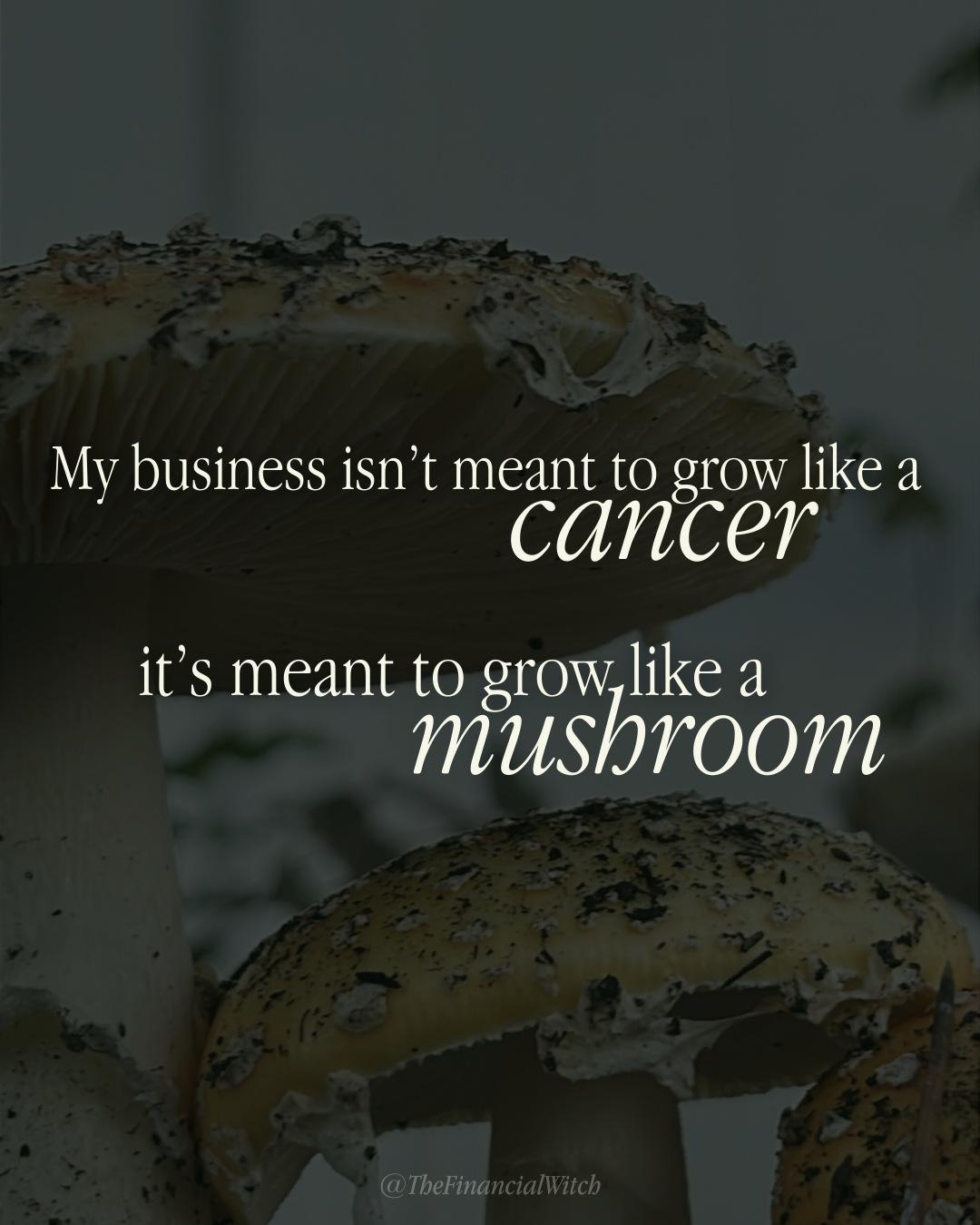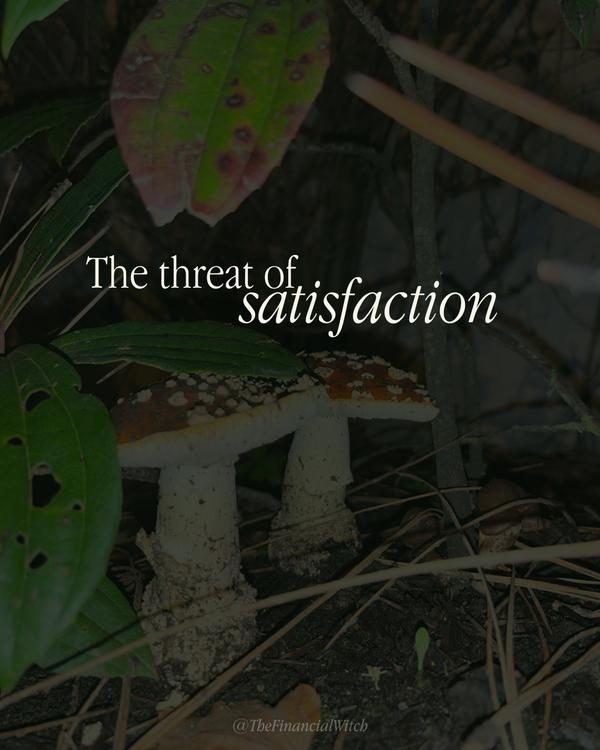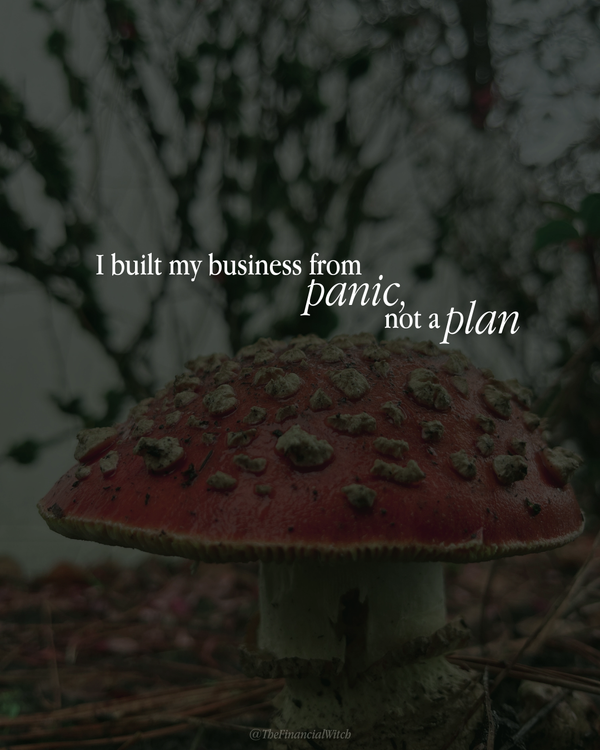I don’t want to scale
My business isn’t meant to grow like a cancer; it’s meant to grow like a mushroom.

When I was in an MLM, one of their main tenets was “life is expensive, so build a big enough money pile for yourself that none of those problems ever affect you.” And this is a predominant school of thought amongst folks surviving late-stage capitalism; why wouldn’t it be? You live in a world that shows you money is the most important thing and you’ll either die or be punished for not having it, so of course one natural response would be to comply—chase capital, and make sure you never have too little of it. But none of the folks on those motivational stages ever asked why life is so expensive, and for whom it is most particularly expensive. They never talked about using their wealth to make life less expensive for anyone else.
They talked about teaching men to fish. They talked about philanthropy and charity but never mutual aid or reparations. They never acknowledged the fact that every single person can’t have a giant pile of money, and they definitely did not acknowledge that their very own piles were being built on the backs of the audience. They needed us to believe that our own pile was coming—and for some it did arrive, but never alongside any acknowledgment of the systemic factors which contributed to certain folks’ successes within that model.
This was a mere microcosm for the bigger lie of capitalism that allows it to function: if people believe they’re destined for material wealth and their temporary poverty is nothing more than a fluke or a generational curse to be lifted, they’ll continue the endless pursuit of capital without ever realizing the tax bracket they intend to ascend to is built on extraction from below. Capitalism is the original pyramid scheme, and it’s evident in the shape & movement of things: a broader, less resourced, more numerous class of people is always being extracted from in order to siphon resources upwards, toward progressively smaller and more exclusive groups of people.
Once I understood that my success—both in the MLM and in capitalism at large—would always require extracting from those with less, I knew I was bound to “fail” spectacularly. Maybe that’s also why I could never fully commit. It wasn’t mycelial thinking at all.
In the mysterious networks of mycelium, trees, and microbial creatures of the hidden world, we learn about interdependence. They remind us of our obligations, rights and responsibilities to one another. - Annie Faye Cheng
The question that plagued me throughout the five years I spent trying to become someone’s upline was: what good is my future wealth if I’m not using it to make others’ lives better? The only answer I ever received was: show them this business—it will make them rich, too.
But what if the answer to everything isn’t just “becoming rich”? It would fix my individual problems, yes; it would definitely soothe my nervous system to no longer worry about how to afford housing. Having more money is the solution to a lot of capitalism’s problems, but that’s because capitalism’s problem is that it’s never satisfied. Consumption and production and capital must be maintained at such voracious levels in order to keep this house of cards standing.
The snowball question kept me up at night for a long time. Living inside a system that extracts, all we know to do is to extract our way to safety. In a system that will never stop demanding more, all we know to do is never stop producing & desiring more. More, more, more. If everyone’s a millionaire, then nobody is. After a while, it started to feel like I was falling for a trap.
And I was.
But there’s no shame in it, because it’s a trap almost every person falls into on their way to dismantling their internalized capitalism.
It’s nobody’s fault for defaulting to the values given to them by their society. It’s nobody’s fault for being a product of their environment—until you recognize the ills of that environment. Awareness is the first step, then after that comes responsibility: the ability to respond.
[A]ny way forward in shaping life after capitalism will come from the organic growth of local like-minded initiatives that can be linked up into a mycelium-like network of learning, caring and activation that is both local and global. - Barbara Lepani
When you choose not to fall into the trap of valorizing endless growth and forever pursuing more, you will swiftly realize two things: how much of our social & systemic messaging centers growth as a universal good, and how much empty space is left behind when you remove that programming from your own life. In the absence of a ladder to climb, you’ll have to find a way to dig into the ground instead. You’ll need to get in touch with your mycelial network. I say “get in touch with” rather than “build” or “find” because mycelium is always there, just out of sight, until the conditions are right for a fruiting body to appear. You have a mycelial network already, and it consists of many human and non-human connections; it’s just your job now to locate these connections, strengthen them, and synthesize with them.
Mycelia are made up of millions of miles of thread-like structures called hyphae, which are constantly reaching and spreading themselves and their resources. They communicate messages between trees, warnings about disease in the neighborhood. Yes, some of us are called to be bombastic brief mushrooms on the surface of the world, but so much more is happening in the darkness of rich soil. We can impact the surface, the forest, the health of the whole world with our earnest organic underground labor. - adrienne maree brown
I never wanted to run my own business so that I could endlessly grow and scale it, so that I could worry when that valorized ideal, growth, was not present. I have always wanted to run my own business so I could experience the sensation of having enough, and so that I could be held by something that is my responsibility and, simultaneously, greater than the sum of my individual parts. I have always wanted to experience myself as the fruiting body, having cultivated the correct conditions for my own thriving because of the vastness and interconnectedness of my own mycelial network. That’s why I think a part of me always knew I was not going to grow in that MLM, because the word “network” held much different connotations and meanings there.
We were frequently discouraged from building personal relationships with our “crossline,” which was anyone not in our upline or downline. If this was a family structure, think of it as you only being allowed to talk to your parents and grandparents and children, but not your siblings or cousins. They always said this was to not “muddy the waters of mentorship” and to keep folks accountable to their finances, but now I realize this is just a finger on the hand of individualism—anti-unionizing speak in a different font. The more solidarity we find with each other, the more resources are shared and the less pressure people feel to endlessly pursue capital. That has always been true, and that doesn’t bode well for a business model built on endless, pyramid-shaped growth which extracts resources from the bottom to funnel to the top.
Running a business as a solo entrepreneur or a small business owner is a unique position where you can operate like part of a mycelial network while interfacing very closely with a system of extraction on a daily basis. It’s filled with contradictions, and can kick up a lot of internalized shame from doing things differently, which is another reason why you need human and non-human relationships which are capable of holding you and witnessing you in the fullness of all these contradictions. As an anti-capitalist business owner, your business is the fruiting body that signals the conditions of the soil and the environment. Each small business is proof of a harmonious confluence between relationships and conditions, just like a mushroom.
My business isn’t meant to grow like a cancer; it’s meant to grow like a mushroom. The cyclical and mysterious nature of mushrooms defies capitalist expectations, and that’s terrifying, but at the same time is necessary for building a post-capitalist world. There’s much we can still learn from mushrooms when we decide to decenter growth and instead return to connection and imagination. This is why I keep coming back to mycelium & the mushrooms: not because they’re magical, but because they refuse to conform to the rules that built the systems collapsing around us. Maybe that refusal—to grow in a way capitalism can’t measure—is the first step toward imagining something else. As Anna Tsing writes in The Mushroom at the End of the World:
We are stuck with the problem of living despite economic and ecological ruination. Neither tales of progress nor of ruin tell us how to think about collaborative survival. It is time to pay attention to mushroom picking. Not that this will save us—but it might open our imaginations.
If this essay landed with you, you’re invited to the next Shame Alchemy for Entrepreneurs call on Monday, May 26th. These are community sessions I facilitate for people navigating the emotional toll of running a business under capitalism. I offer structure, reflection, and prompts to help us move through what’s coming up, together. This is the last call that will be free to the public—after this, they’ll be exclusive to the Co-Founder tier ($6/month). If you’ve been wanting to come, or it sounds like a space you’d benefit from, I’d love to have you there.
Thank you for reading!
Your ongoing support makes it possible to continue writing, podcasting, & offering more sliding scale and no-cost offerings in the future. To become a Cosmic Co-Op member, click here.
Share this publication: like, comment, reply to this email, or link me on your social media! I love to receive thoughtful feedback and continue conversations beyond this platform--especially in our community Discord server.
If you would like to pay for a subscription, but don’t want to do so through Ghost, you can pay via my Venmo. If you’d like a paid subscription, but can’t afford it, please reach out to me and I’ll add you—no questions asked.




